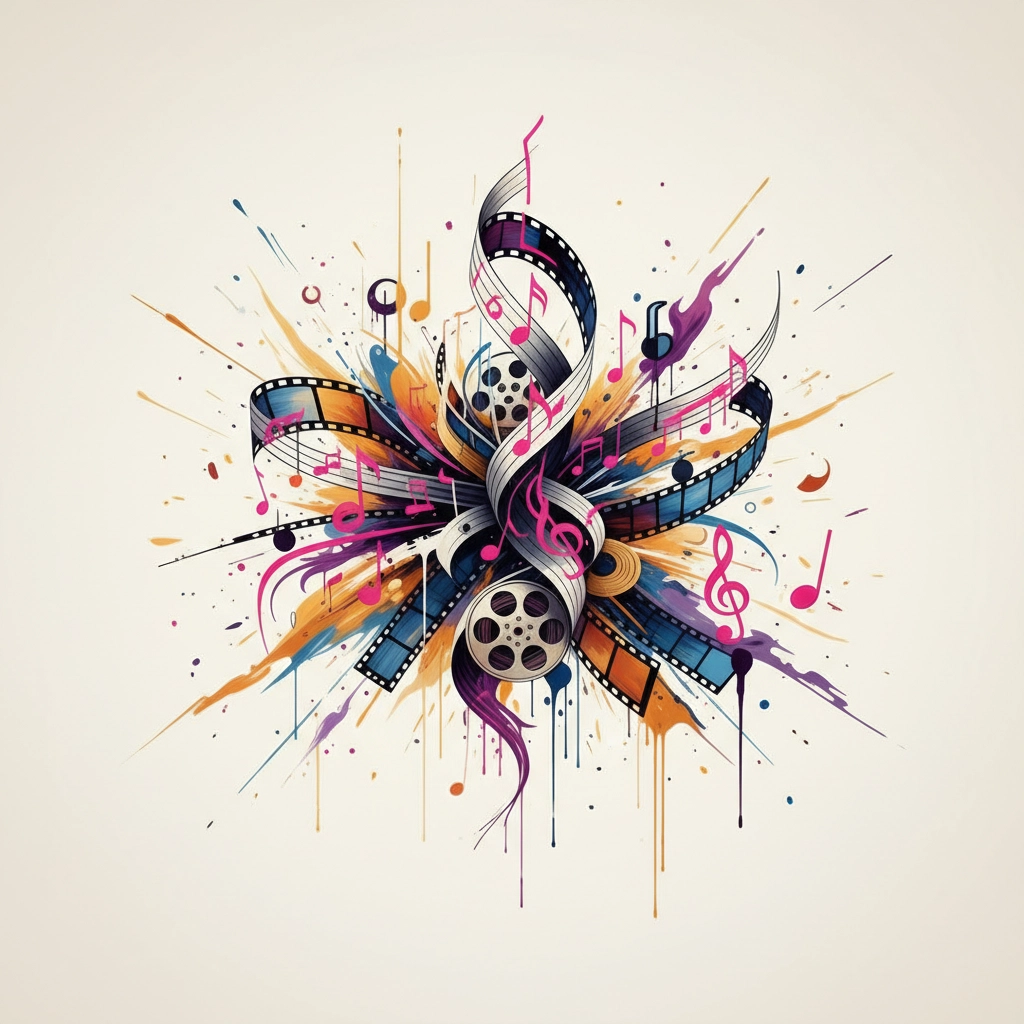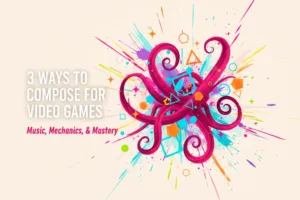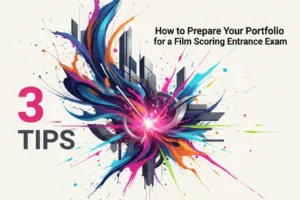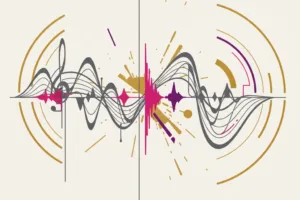
How to Compose Music for Films
- Posted by Filip Sijanec
- Date September 26, 2025
- Comments 0 comment
Reading time: 7 minutes
Composing music for films is one of the most rewarding yet challenging disciplines in contemporary music. It’s an art form that requires you to become both a musical storyteller and a collaborative partner, crafting soundscapes that enhance narrative whilst remaining invisible to the audience. Whether you’re just starting out or looking to refine your approach to composing for film and television, understanding the fundamental principles of film scoring will set you on the path to creating memorable, effective film music.
Understanding Your Role as a Film Composer
As a film composer, your primary responsibility isn’t to write beautiful music: it’s to serve the story. This might sound limiting, but it’s actually incredibly liberating once you embrace it. Your music becomes a character in its own right, one that can reveal inner thoughts, foreshadow events, and guide the audience’s emotional journey in ways that dialogue and visuals alone cannot achieve. The storytelling power of music in film is immense. A single melodic phrase can establish a character’s essence, whilst a shift in harmony can signal impending danger. Consider how John Williams’ two-note shark motif in Jaws creates more tension than any visual could, or how Hans Zimmer’s Inception score uses time-stretched audio to reflect the film’s time-dilation concept. These aren’t just musical flourishes: they’re integral narrative devices. Your music needs to exist within the film’s ecosystem, complementing sound effects, dialogue, and the overall sonic landscape. This means sometimes being bold and prominent, other times stepping back to let other elements breathe. The best film scoring lessons teach you this delicate balance between musical assertion and narrative service.Collaborating with Directors and the Creative Team
Successful film composition is fundamentally collaborative. Your relationship with the director is paramount: they’re your primary creative partner and the keeper of the film’s overall vision. Start by asking the right questions: What emotions should the audience feel? Which characters need musical representation? Are there specific musical styles or genres that align with the film’s world? Directors often communicate in non-musical terms, and that’s perfectly normal. They might describe wanting something that feels “warmer” or “more urgent” rather than requesting specific chord progressions. Learning to translate these creative directions into musical choices is a crucial skill. Create musical sketches and demos early in the process to establish a common musical vocabulary with your director. Remember that editors are also key collaborators. They’ve lived with the footage longer than anyone and understand its rhythmic pulse intimately. Their insights about pacing and where music feels natural versus forced can be invaluable. Building strong relationships with the entire post-production team will serve you throughout your career in music for film and TV.The Spotting Process and Scene Analysis
Spotting sessions are where the rubber meets the road in film scoring. This is where you and the director watch the film together, deciding where music should start and stop, and discussing the emotional goals for each cue. Approach each scene analytically: What is the dramatic function of this moment? What does the character need emotionally? How does this scene connect to the larger narrative arc? Understanding scenes goes beyond their immediate dramatic content. Consider the subtext: what isn’t being said? Often, music fills the emotional gaps between dialogue, revealing character motivations or creating dramatic irony. A romantic scene might need music that hints at future heartbreak, whilst an apparently happy moment might require underlying musical tension to suggest impending conflict. Pay attention to the film’s pacing and edit points. Music can either support the existing rhythm or create counterpoint to it. Sometimes a scene needs music that matches its frantic editing, other times music can provide calm stability against rapid-fire cuts. This analytical approach to scene work is something we emphasise heavily in our composition lessons.Developing Musical Themes and Emotional Arcs
Thematic development is the backbone of memorable film scores. Start by identifying the core themes of your film: not just plot elements, but emotional and philosophical themes. A film about forgiveness might need a musical theme that evolves from discord to resolution over the course of the story. Leitmotifs: recurring musical themes associated with characters, places, or concepts: remain one of the most powerful tools in film scoring. But avoid being too literal. A character theme doesn’t need to play every time that character appears; instead, use it strategically to highlight character growth or important story moments. Consider how your themes will develop throughout the film. A heroic theme might start tentatively, grow in confidence, face corruption or doubt, then emerge transformed by the film’s end. This musical arc should mirror and support the narrative arc, creating a deeper layer of storytelling that audiences feel subconsciously. Emotional arcs require careful planning. Map out the emotional journey of your film, identifying peaks and valleys, moments of tension and release. Your musical choices should support these emotional shifts whilst maintaining coherence across the entire score.Workflow Organisation and Production Techniques
Efficient workflow organisation can make or break a film scoring project, especially when facing tight deadlines. Start by creating a comprehensive spotting sheet that includes timecode, scene descriptions, musical goals, and technical requirements for each cue. This becomes your roadmap throughout the composition process. DAW workflow training is essential for modern film composers. Whether you use Logic, Pro Tools, Cubase, or another platform, learn to work efficiently within your chosen system. Set up template sessions with your go-to instruments and routing, create a consistent file naming system, and establish backup protocols. Mockup creation has become increasingly important in film scoring. Directors often need to hear realistic representations of your ideas before committing to expensive recording sessions. Invest time in learning digital mockup composing techniques and building a quality sample library. The closer your mockups sound to the final product, the smoother your collaboration will be.Traditional vs. Hybrid Scoring Approaches
Today’s film composers have an unprecedented range of sonic possibilities at their disposal. Traditional orchestral scoring remains powerful and relevant, but hybrid approaches that combine live instruments with electronic elements offer exciting creative opportunities. Orchestral writing requires deep understanding of instrumental capabilities, ranges, and timbres. If you’re pursuing orchestration lessons, focus on practical orchestration that works within film music’s quick turnaround demands. Learn to write efficiently for different ensemble sizes: you won’t always have access to a full symphony orchestra. Electronic and hybrid scoring allows for unique sonic textures impossible with traditional instruments alone. Synthesisers can create otherworldly atmospheres, processed acoustic instruments can blur the line between organic and synthetic, and sampling technology lets you incorporate found sounds and field recordings into your musical palette. The key is matching your scoring approach to the film’s needs. A period drama might benefit from traditional orchestral colours, whilst a sci-fi thriller could explore cutting-edge electronic textures. Many successful composers develop signature hybrid approaches that become part of their musical identity.Building Your Film Scoring Portfolio
Your portfolio is your calling card in the film music world. Start by scoring short films: they’re everywhere and often need music. Even unpaid projects can provide valuable experience and portfolio pieces. Focus on creating diverse examples that showcase your range whilst maintaining a consistent level of quality. Document your work professionally. Create audio reels that demonstrate different aspects of your compositional abilities: action sequences, emotional scenes, character themes, and atmospheric pieces. Include both isolated music and music mixed with dialogue and sound effects to show how your work functions within the complete film context. Consider creating original compositions inspired by existing films as portfolio pieces. This demonstrates your ability to analyse and respond to visual media whilst showcasing your musical voice. Just ensure you’re creating transformative work rather than copying existing scores. Networking within the film industry is crucial for portfolio development. Attend film festivals, composer workshops, and industry events. Build relationships with directors, producers, and other composers. The film industry runs on relationships and recommendations: your next opportunity often comes through connections rather than cold submissions.How Sound Arcade Academy Supports Your Film Scoring Journey
At SoundArcade Academy, we understand that film composer mentorship requires personalised attention to develop your unique voice whilst mastering fundamental techniques. Our 1:1 composition lessons provide focused guidance on everything from basic music theory for screen composers to advanced orchestration for media. Whether you’re preparing for NFTS entrance exams or RCM entrance exams, our experienced mentors provide portfolio guidance for film schools and composition preparation tailored to your specific goals. We bridge the gap between academic study and professional practice, ensuring you’re ready for the demands of real-world film scoring. Our comprehensive approach includes composer career mentoring that goes beyond technical skills to address industry navigation, client relationships, and career development strategies. Because becoming a successful film composer isn’t just about writing great music: it’s about building a sustainable creative career. Film scoring is a craft that rewards both technical mastery and creative courage. Start with small projects, focus on serving the story, and never stop learning. The combination of musical skill, collaborative spirit, and storytelling instinct will serve you throughout your journey in this endlessly fascinating field.Further Reading
- Film scoring 101: how to start composing for movies (Native Instruments Blog) – A practical guide from industry experts covering essential elements, the composing process, and how to get started in film music.
- Tips for Scoring a Movie | How Empathy Can Guide You (VCFA) – A 2025 article by composer Rick Baitz that emphasizes emotional connection, mirroring film structure in music, and effective collaboration with directors.
Filip Sijanec is an award-winning composer and educator based in London. He serves as Professor at the Royal College of Music and NFTS, and teaches composition and music technology at ICMP and ThinkSpace, mentoring aspiring composers. He is the composer for an Oscar-nominated film and creates original music for film, games, theatre, and commercials.
You may also like

How to Compose Music for Video Games
September 26, 2025

How to Prepare Your Portfolio for a Film Scoring Entrance Exam
September 20, 2025

On Ear Training & Craft: Why Your Ear Matters More Than Your Plugins
September 11, 2025
